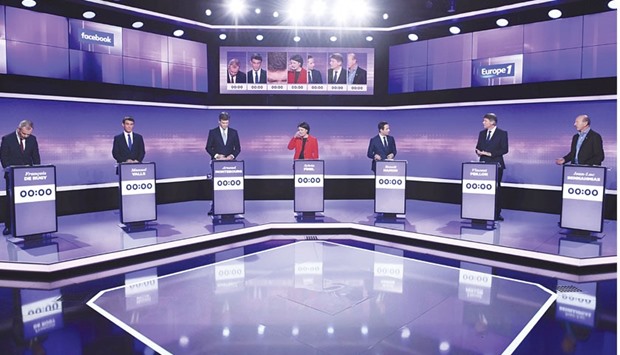Former prime minister Manuel Valls, who forced through labour reforms that were deeply unpopular with many Socialist members, was the long-time favourite to clinch the nomination.
But he is being chased down by two candidates from the party’s left flank, the protectionist maverick Arnaud Montebourg, and Benoit Hamon, who are tipped by pollsters to beat Valls in a second-round run-off on January 29.
The odds will be stacked against whoever emerges victorious, with polls showing the Socialists failing to get past the first round of the presidential election on April 23.
Surveys suggest the election is shaping up as a three-way contest between conservative ex-premier Francois Fillon, far-right leader Marine Le Pen and Emmanuel Macron, an ex-economy minister.
Macron, a relative newcomer to politics who quit the government last year to found his own centrist En Marche! (“On the Move”) movement, is stealing the limelight from his Socialist rivals.
A poll published on Thursday gave the 39-year-old between 17% and 21% of the vote in the first round of the election.
“The Macron effect is real,” said political analyst Stephane Rozes, predicting that the fresh-faced champion of the digital economy would draw votes from both the left and centre.
Some Socialist heavyweights have already hinted that they could support him over their party’s nominee if he looks to have a better chance against Le Pen.
“I am very hesitant like a lot of people, and the last debates haven’t helped me make up my mind,” Socialist Foreign Minister Jean-Marc Ayrault said yesterday morning.
Asked during a televised debate on Thursday whether they would contemplate stepping back and supporting Macron, Valls, Montebourg and Hamon all demurred.
“He’s a Tony Blair of 20 years ago,” Hamon said dismissively.
Montebourg accused his fellow former economy minister of fielding “vague” proposals.
Macron himself has ruled out a pact with the Socialists, announcing on Thursday that he would run his own candidates in parliamentary elections set for June.
Further splitting the vote on the left is Communist-backed firebrand Jean-Luc Melenchon, who like Macron is polling in the double digits.
A Fillon-Le Pen presidential run-off is currently seen as the most likely scenario, as voters across Europe tilt to the right or to anti-establishment parties like Le Pen’s National Front.
The outcome of the Socialists’ nominating contest is important, said former party strategist Gerard Le Gall.
“The stakes for the PS are historic” because it will either reaffirm or undermine the party’s supremacy on the left, a position it wrested from the Communists in 1978 for the first time, he said.
The signs are inauspicious for the Socialists, whose primary has failed to energise voters hungry for change after four years of stagnation under Socialist President Francois Hollande.
The head of the body organising the vote, Christophe Borgel, said yesterday that he was aiming for 1.5mn voters tomorrow, far less than the 4.0mn who turned out for the Republicans primary.
“No-one could imagine that with the left so divided that we could have as many voters as the right,” he said on the LCP channel.
In the last debate between the seven candidates on Thursday, Hamon was attacked over his proposal to pay the poor and 18-25-year-olds a universal income of €600 ($641) a month.
Valls, who has campaigned as a responsible pair of hands on the state purse, hit out at “leftists who make unlimited promises”.
Montebourg noted that Hamon’s proposal would take up most of France’s budget.
Valls, who was slapped this week by a protester, has had a difficult ride since joining the race to succeed Hollande, who announced in December that he would not seek re-election.
The former premier who set out to modernise the Socialist Party has struggled to unite his camp, with his opponents accusing him of betraying leftist ideals.
All the candidates called for the European Union to adopt more protectionist policies to counter Donald Trump’s promise to more aggressively defend American interests.
The four other candidates running in the primary are: former education minister Vincent Peillon, ecologist Francois de Rugy, ex-MEP Jean-Luc Bennahmias, and radical left candidate Sylvia Pinel.

